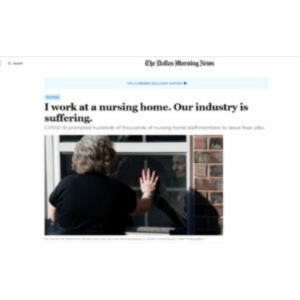Cambridge Caregiver Anita wrote an opinion for the Dallas Morning News
I work at a nursing home. Our industry is suffering.
Nursing homes and assisted living facilities were hit hard by COVID-19. Though cases have subsided, we are now forced to deal with another epidemic: staffing shortages.
We have seen a mass departure of nursing home staff. Burnout and continuous exposure to the virus are some of the reasons for the exodus. Now, the surge in travel assignments is escalating the problem.
According to reporting by The Washington Post, close to 420,000 employees have left nursing homes since February 2020. Many of these employees were poorly paid certified nursing assistants, the cornerstone of the nursing home workforce. Some staff completely left the profession, and others traded staff pay for travel pay.
As a society, we are morally obligated to care for our elderly, but it has become increasingly difficult to provide quality care as nursing home staff are getting paid half the amount the traveling CNAs earn. I personally know two CNAs who went from making $14 per hour on staff to $30 per hour as travel CNAs.
Most of the caregivers I work with are immigrants, and needless to say, we came here to work and make money, money for our upkeep here, but most important to send home to family. When an opportunity presents itself to be able to make more money, it would be foolish not to take it.
The elderly we care for thrive on familiarity and stability, particularly those who are cognitively impaired. We try to create an atmosphere of familiarity to reduce stress and anxiety not only for the residents, but for their families as well. Imagine visiting your elderly mother or father at a care facility and seeing the same faces for years. That is part of what makes the job rewarding from a caregiver’s standpoint and what helps families sleep at night, knowing that their loved one is in good, caring and capable hands.
When I joined my company in 2018, there were people who had worked there since it was founded in 2009. Many of those employees knew the job well, but above all, they had established a good rapport with the residents and their families. With the onset of the virus in 2020, the harmony faded. Some families moved their parents out of care homes, and some staff left for better opportunities.
The Migration Policy Institute reported in 2020 that an estimated 6 million immigrants nationwide work in front-line occupations such as food production, health care and transportation, thereby making us more susceptible to COVID-19. We did not have the privilege of sheltering in place and working from home, but we risked our lives to take care of elderly American citizens. This is not a request for handouts or government aid. It is an appeal for equality and fairness when it comes to pay.
Therefore, my petition to help address the issue of staffing shortages is that the government ensure that nursing home staff members get compensated fairly and adequately. As the cost of living rises, so should the pay, and this could be achieved by providing funding to nursing homes and facilities all over the country.
Employers such as mine genuinely care for their caregivers, but keeping up with the travel pay is beyond their financial capabilities. They need help, and that funding could be contingent on facilities adhering to care standards and commit to increasing the staff-to-resident ratio. Such homes and facilities would find themselves in great demand and the geriatric population would once again receive the quality care they need.
Anita K. Mupingo is a social work student at Texas Woman’s University. She lives in Anna. She wrote this column for The Dallas Morning News.


